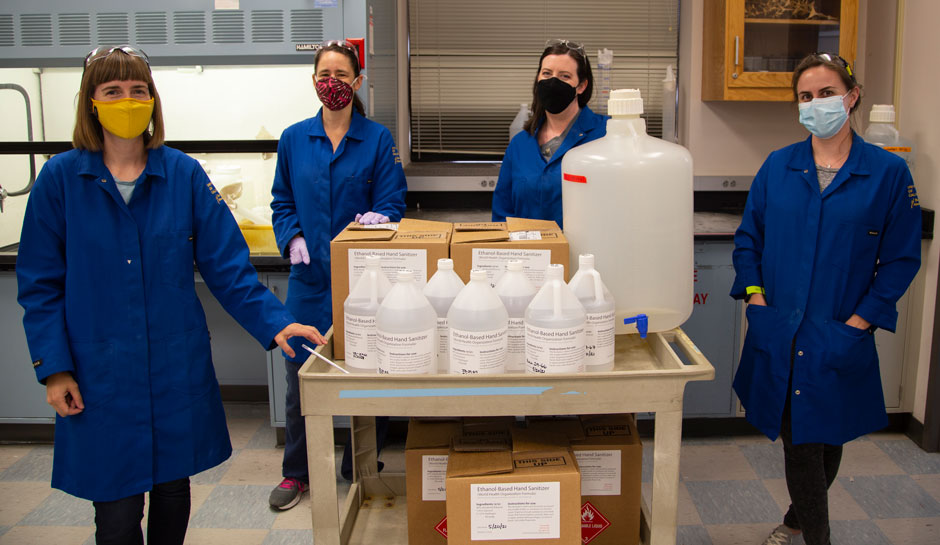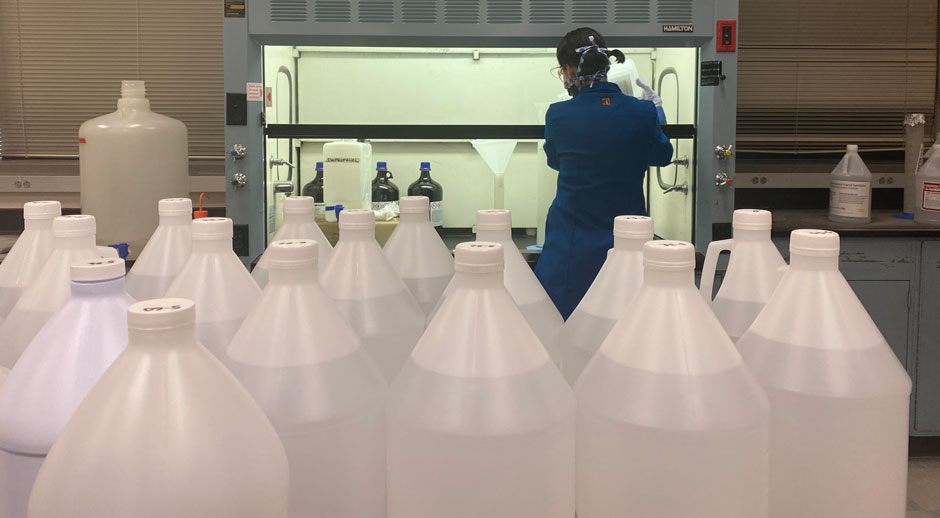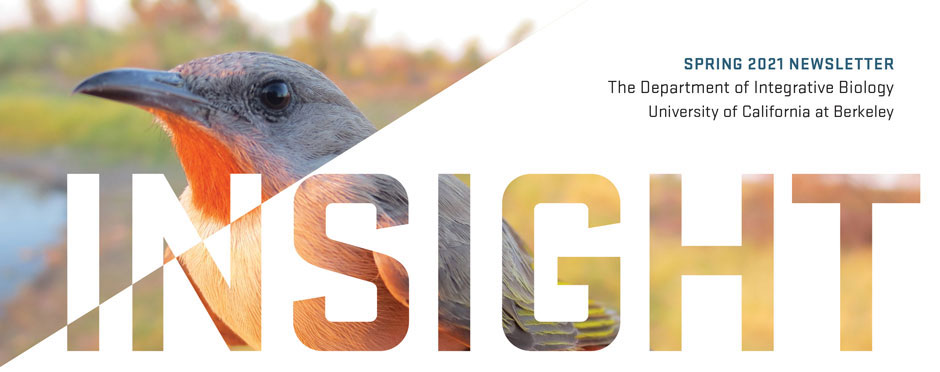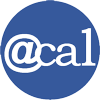The IB Hand Sanitizer Project:
Harnessing Academic Privilege for Community Impact
By Kirsten Mickelwait
 Hand sanitizer mixing team (left to right): Elizabeth Cash, Lydia Smith, Ana Lyons, and Kaitlin Allen. Not pictured: Betasbé Castro Escobar & Andrea Salvador Pascual. |
It’s now been more than one year since our campus—and our world—went into a previously unimagined lockdown. Among our lasting memories from those early days are the supply-chain shortages for such items as toilet paper, masks, and hand sanitizer. Initiatives sprung up across campus to help with COVID-borne emergencies, including the Common Humanity Collective (CHC), “a mutual aid group of UC Berkeley scientists, Bay Area activists, community leaders, and conscious neighbors,” that manufactured and distributed hand sanitizer, disinfectant wipes, and masks for the Bay Area’s underserved communities.
As part of that effort, the IB Hand Sanitizer Project was born in April 2020 and managed by Ana Lyons, a rising sixth-year IB PhD student in the Caroline Williams lab, and Lydia Smith, a lab manager specialist for IB and the Museum of Vertebrate Zoology. Lyons was intrigued when she saw the CHC mentioned in a Twitter feed, and thought Smith’s organizational skills would be a strong asset to an IB branch of the CHC’s group. “I was so moved when Ana reached out to me,” Smith says. “It felt good to be able to do something productive at such a time of crisis.”
The two collaborated with CHC co-founders Abrar Abidi, a graduate student in the MCB Tjian-Darzacq lab, and Yvonne Hao, assistant specialist in the same lab; Dr. Lisa White, director of Education and Outreach at the Museum of Paleontology; and Monica Albe, Graduate Student Services Advisor for IB. The group met over Zoom to build infrastructure, organize production and delivery, and fundraise for the project. In the following months, the IB Hand Sanitizer Project grew to a team of eight volunteers that regularly supplied hand sanitizer to the CHC’s broader distribution network.
 IB volunteers have mixed over 1,620 gallons of sanitizer for the Bay Area's underserved communities. |
IB instruction manager Tami Mau arranged access to the Bio 1B teaching lab in VLSB, and the first 600 gallons were financed directly from the support of the IB community. “We exceeded our original fundraising goal four-fold,” says Smith. “In one day, we had enough contributions to order ethanol for four months of production.” The group produced the sanitizer in one-gallon plastic containers and passed them onto a bottling team at CHC. At the time of this writing, IB volunteers have mixed 1,620 gallons of sanitizer—enough to fill 103,000 two-ounce spray bottles.
Since the project’s inception, hand sanitizer has become easier to obtain. But community organizations still prefer the IB-produced version because it’s made according to World Health Organization protocols. It’s made of just five ingredients—ethanol, isopropanol, glycerol, hydrogen peroxide, and water—with no allergenic additives.
The experience has made a strong impact on both women. “It was humbling to realize what huge amounts of privilege we have at a research university like Berkeley; to have access to what, at the time, were very limited resources—lab space, connections to ingredient supply chains, and the know-how to make it happen,” says Lyons. Might this effort influence her future career path? “Deeply and profoundly,” she says. “I’m still enthusiastic about a research career. But I’ll be more mindful of the translational impacts of my research, in the larger context of being a supportive community member.”
Smith has a similar takeaway. “Between the pandemic and the racial justice movement, we’ve learned that we need to give a lot more thought to how we can better harness the institutional power and resources we have,” she says. “How do we think about the community needs we can give back to? That should be a more core part of our research careers.”
Learn more about the Common Humanity Collective and how to get involved
 Hand Sanitizer Project Team Monica Albe Kaitin Allen Elizabeth Cash Betsabé Castro Escobar Ana Lyons Andrea Salvador Pascual Lydia Smith Dr. Lisa White |
Back to Main Spring 2021 Newsletter Page







